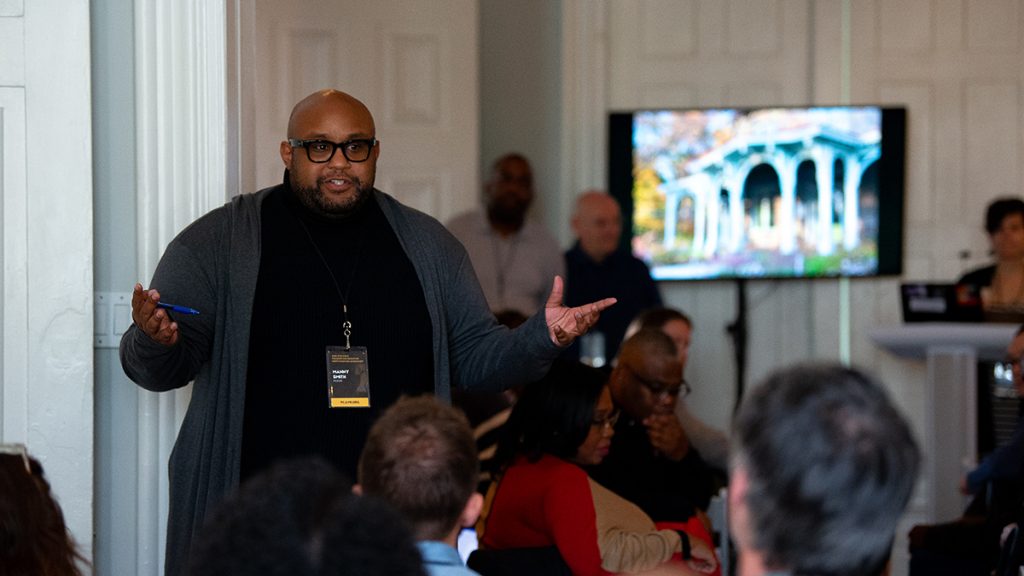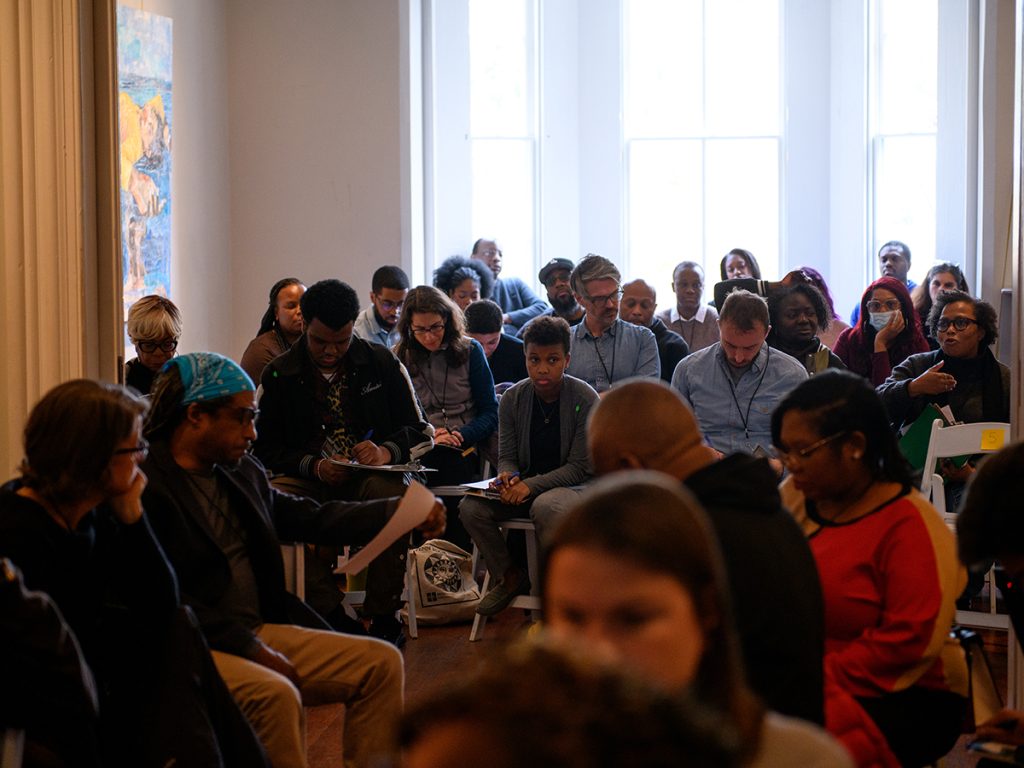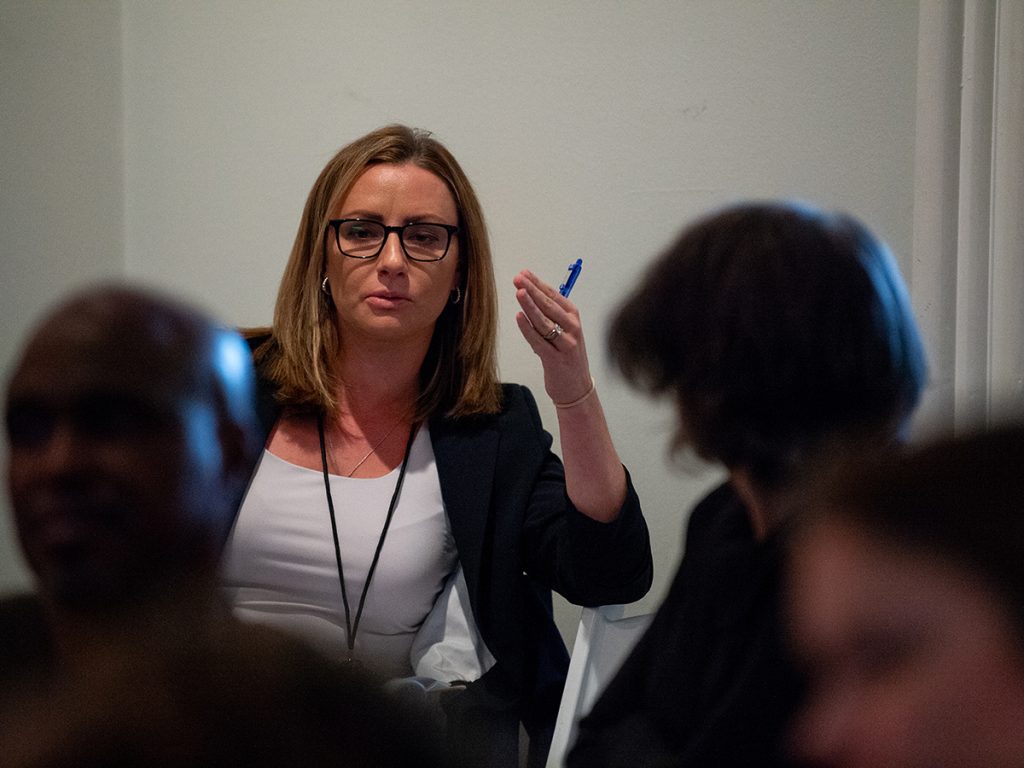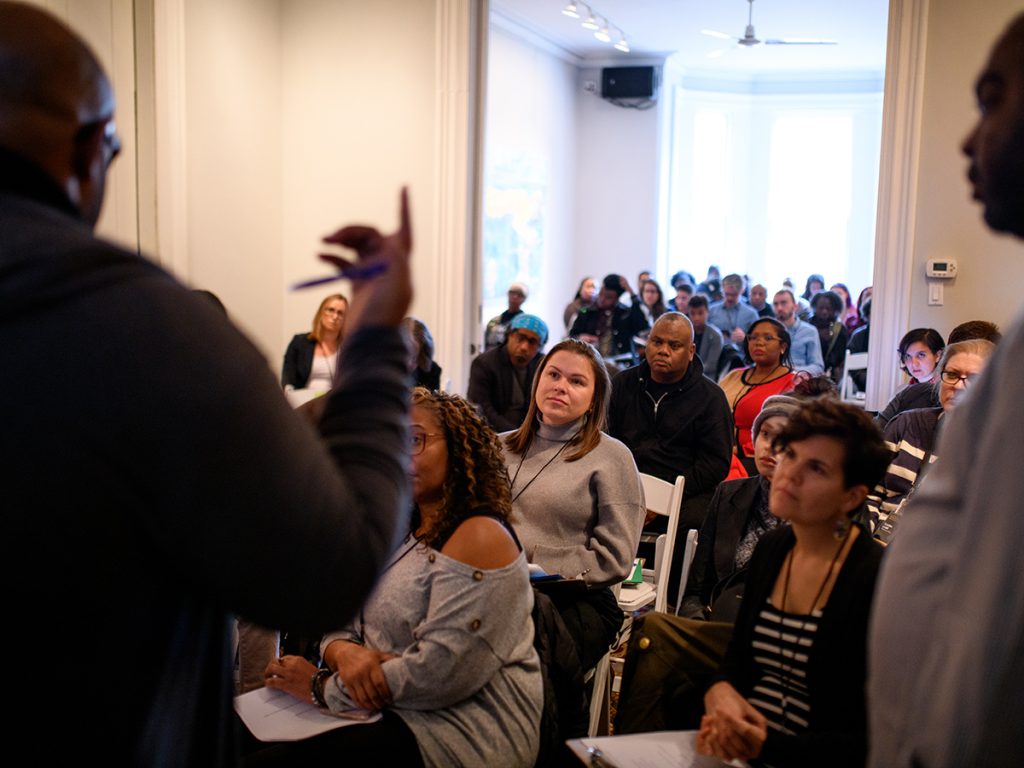
Manny Smith leads part of the Gun Violence Prevention Reporter Certificate Workshop, hosted by the Philadelphia Center for Gun Violence Reporting at the Cope House at Awbury Arboretum in Philadelphia on Wednesday, November 15, 2023. Photo: Kriston Jae Bethel for PCGVR
Philadelphia center gives reporters, editors new tools for deeper, more trauma-sensitive coverage of gun violence
The gathering included gun violence victims, not just journalists
The views expressed in this column are those of the author and do not necessarily reflect the views of the Reynolds Journalism Institute or the University of Missouri.
When I walked into the sunlit meeting room of Philadelphia’s Awbury Arboretum on a Saturday morning last November, I was thrilled to see several of my sources eating breakfast and chatting with reporters. The director of a juvenile justice organization I frequently covered was there, as was the head of a local men’s group focused on violence prevention.

We were all attending a daylong Gun Violence Prevention Reporter Certification Workshop, which brought together 25 journalists with 15 gun violence survivors and co-victims (those who’ve lost someone to gun violence) to discuss how media outlets can tell deeper, more impactful stories that better encapsulate the experiences of those who experience it firsthand.
Throughout the day, non-journalists in the room shared harmful experiences they’d had with the media: reporters who didn’t follow up with them, got the facts wrong, or condensed an hour-long interview into a two-line quote. They asked reporters to tell fuller stories about people killed by gun violence and to stop perpetuating stereotypes about neighborhoods where shootings occur.
In a feedback survey distributed the day of the event, one nonprofit director called out newsroom higher-ups for encouraging reporters to produce short segments or articles on tight deadlines.
“I would love to have included ways that journalists can push back against the structural pressures they have to deal with,” said Kendra Van de Water, co-founder of a violence prevention nonprofit called YEAH Philly. “We want to inspire journalists to do better even if that means taking a risk or making their editors and managers uncomfortable.”
The workshop was designed by the Philadelphia Center for Gun Violence Reporting, which provides journalists with community-informed, trauma-sensitive guidance. This May it published “Better Gun Violence Reporting: A Toolkit for Minimizing Harm,” which served as the base curriculum for the training. The toolkit involves a list of do’s and don’ts for gun violence reporting, and lays out the differences between covering the beat as a crime issue versus as a public health issue.
The center has been studying the impact of gun violence journalism on shooting victims and their loved ones. The center’s analysis of 192 Philadelphia news TV clips found that 84% contained at least one element that could be harmful to communities, gun violence survivors and audiences. Examples included crime scene visuals, a lack of follow-up with survivors and their families and use of sensitive details that can endanger the victim, such as the name of the treatment hospital.

At the certification training, survivors and co-victims had the opportunity to talk off-record with reporters about their experiences being interviewed. They were also able to learn more about the journalistic process and the barriers and constraints some reporters face in their newsrooms.
In addition to speaking with impacted community members, journalists received presentations from academics on how to avoid episodic coverage of gun violence and instead approach the beat from a public health framework. Attendees received a paper certificate and can now identify as a Gun Violence Prevention Reporting Fellow with the Philadelphia Center for Gun Violence Reporting.
A few key tips for reporters included:
- Looking for community members and organizations to provide context after a shooting (when reporting on scene);
- Speaking to loved ones of victims in order to present a holistic portrait of the individual;
- Avoiding letting police be the sole perspective in a story;
- And being transparent with survivors and co-victims about what you’re producing (including the scope, the deadline, etc) and how their participation will result in better reporting.
Alaina Bookman, an investigative reporter at AL.com focusing on gun violence, flew in for the November meetup. She said it inspired her to start including mental health organizations and other community resources to her stories.
“One of the easy, practical tips was making sure there are resources that they get at the bottom of the article or throughout the article,” she said. “I wish I’d thought about it before.”
She said while becoming certified could be an important designation in the journalism industry, reporters have to do more to gain the respect of survivors and co-victims.
“One of the biggest takeaways is building trust with your community and that’s a credibility of its own,” she said.

Bookman spoke about her experience at the workshop during a webinar with the Association of Health Care Journalists earlier this year.
Other reporters said the following in surveys distributed the day of the workshop.
“As a journalist who deeply cares about Philly, communities [and] how gun violence and other public health issues impact us, it was beneficial to bring a community together who cares about better gun violence reporting and to discuss tools for improvement.”
“It was rich with specific, actionable insights on how to think about and cover gun violence stories, as well as common constraints and challenges and advice for evangelizing for better coverage internally.”
“I want to spend less time on breaking news. When I do spend time on it, I want it to always include humanizing tidbits, context, resources, etc.”
Aside from guidance about public health framing and the harms of episodic reporting, sessions also covered the vicarious trauma incurred by journalists on the beat, and advice to reporters about how to talk with editors about shifting the narrative.
The event also featured a screening of The Second Trauma, a documentary produced by gun violence survivor and PCGVR staffer Oronde McClain and Temple University professor Yvonne Latty, director of the Logan Center for Urban Investigative Reporting at Temple University. , The film, a collaboration between both organizations, covers McClain’s experience as a childhood gun violence survivor and the harmful interactions with the media that followed. The film has been touring universities across the U.S.
Jim MacMillan, director of the Philadelphia Center for Gun Violence Reporting, said he hopes to certify 250 more reporters at a national training, to be held in Philadelphia next spring.
Cite this article
Caiola, Sammy (2024, Sept. 4). Philadelphia center gives reporters, editors new tools for deeper, more trauma-sensitive coverage of gun violence. Reynolds Journalism Institute. Retrieved from: https://rjionline.org/news/philadelphia-center-gives-reporters-editors-new-tools-for-deeper-more-trauma-sensitive-coverage-of-gun-violence/
